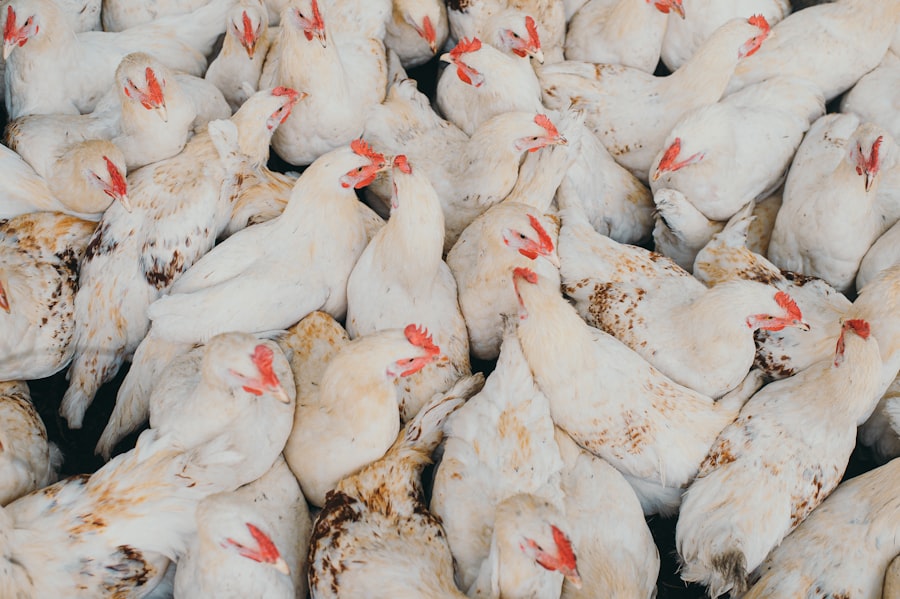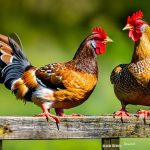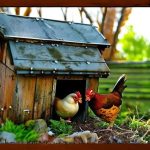Keeping ducks and chickens together in a backyard flock has become increasingly popular in recent years. Many people are discovering the benefits of raising these two species together, as they can complement each other in various ways. Ducks and chickens have different characteristics and requirements, but with careful planning and preparation, they can coexist harmoniously. In this article, we will explore the topic of keeping ducks and chickens together, discussing the benefits, factors to consider, space requirements, feeding, health considerations, and social dynamics between the two species.
Key Takeaways
- Ducks and chickens can be kept together in the same coop and run.
- Keeping ducks and chickens together can provide benefits such as pest control and increased egg production.
- Factors to consider before keeping ducks with chickens include breed compatibility and space requirements.
- Preparing a chicken coop for ducks involves adding a water source and modifying the nesting boxes.
- Feeding ducks and chickens together requires providing appropriate feed for both species and monitoring for overconsumption.
Understanding Ducks and Chickens
Ducks and chickens are both domesticated birds that are commonly kept for their eggs and meat. However, they have distinct characteristics that set them apart. Chickens are ground-dwelling birds that are known for their ability to scratch the ground for food. They have a compact body shape, with short legs and wings that allow them to fly short distances. Chickens also have a wide range of breeds, each with its own unique traits such as egg-laying ability, meat production, or ornamental features.
On the other hand, ducks are waterfowl that are adapted for swimming and floating on water. They have webbed feet that enable them to paddle through water effortlessly. Ducks have a longer body shape compared to chickens, with a more upright posture. They also have a wider bill that they use to filter food from water or to dig in the ground for insects and worms.
Benefits of Keeping Ducks and Chickens Together
Keeping ducks and chickens together in a backyard flock can offer several benefits. One of the main advantages is pest control. Ducks are excellent at foraging for insects and slugs, which can help reduce pest populations in your garden or yard. Chickens also contribute to pest control by scratching the ground and eating insects.
Another benefit is egg production. Both ducks and chickens lay eggs, but they have different laying patterns. Chickens typically lay eggs in the morning, while ducks lay eggs throughout the day. By keeping both species together, you can have a steady supply of eggs throughout the day.
Furthermore, ducks and chickens can provide companionship for each other. They have different behaviors and social dynamics, which can create an interesting and diverse flock. Ducks are known for their playful and curious nature, while chickens are more social and hierarchical. The combination of these two species can create a lively and engaging flock.
Factors to Consider Before Keeping Ducks with Chickens
Before introducing ducks to a chicken flock, there are several factors that need to be considered. One important factor is breed compatibility. Not all chicken breeds are suitable for cohabitating with ducks. Some chicken breeds may be too aggressive or territorial, which can lead to conflicts with ducks. It is important to choose chicken breeds that are known to be docile and tolerant of other species.
Another factor to consider is space requirements. Ducks require more space than chickens, especially when it comes to water. Ducks need access to a pond or a large container of water for swimming and cleaning themselves. They also need ample space for foraging and exercise. It is important to ensure that your coop and outdoor area can accommodate the needs of both ducks and chickens.
Careful planning and preparation are essential before introducing ducks to a chicken flock. It is recommended to gradually introduce the two species to each other, allowing them to get used to each other’s presence before fully integrating them. Providing separate areas within the coop for ducks and chickens initially can help prevent any potential conflicts or stress.
Preparing Your Chicken Coop for Ducks
Modifying your chicken coop to accommodate ducks is necessary before introducing them to your flock. One important modification is providing adequate water space for the ducks. Ducks need access to water for swimming, cleaning their feathers, and maintaining their overall health. This can be achieved by adding a small pond or a large container of water inside or near the coop.
Nesting space is another consideration. Ducks require nesting boxes that are larger and deeper than those used by chickens. Ducks prefer to lay their eggs in a more secluded and protected area, so providing appropriate nesting boxes will ensure their comfort and productivity.
It is also important to consider the flooring of the coop. Ducks produce more waste and require a different type of bedding compared to chickens. Ducks prefer straw or wood shavings as bedding material, which can help absorb moisture and control odor.
Space Requirements for Ducks and Chickens

Both ducks and chickens require adequate space to thrive and remain healthy. Ducks need more space than chickens due to their larger size and need for water. For a mixed flock of ducks and chickens, it is recommended to provide at least 4 square feet of indoor space per duck and 2 square feet per chicken. For outdoor space, allow for at least 10 square feet per duck and 5 square feet per chicken.
It is important to note that these are minimum space requirements, and providing more space is always beneficial. Ducks are active birds that enjoy foraging, swimming, and exploring their surroundings. Having ample space allows them to engage in these natural behaviors, promoting their overall well-being.
Feeding Ducks and Chickens Together
Feeding a mixed flock of ducks and chickens requires some considerations to ensure that both species receive the nutrients they need. While both ducks and chickens can eat a similar diet consisting of grains, vegetables, fruits, and protein sources, there are some differences in their dietary needs.
Ducks require more niacin in their diet compared to chickens. Niacin is essential for proper growth and development in ducks, as well as for preventing leg problems. It is important to provide a niacin supplement or feed that is specifically formulated for ducks to meet their nutritional requirements.
Another consideration is feeding behavior. Ducks are messy eaters and tend to waste more food compared to chickens. Providing separate feeding areas for ducks and chickens can help minimize food waste and ensure that each species gets their fair share of food.
Health Considerations for Ducks and Chickens
Keeping ducks and chickens together can pose some health risks, so it is important to be aware of common health issues and take preventive measures. One potential health risk is the transmission of diseases between the two species. Ducks can carry diseases such as avian influenza or duck viral enteritis, which can be transmitted to chickens. Regular health checks, vaccinations, and proper biosecurity measures are essential to prevent the spread of diseases.
Another health consideration is water quality. Ducks require clean and fresh water for swimming and drinking. Stagnant or dirty water can lead to bacterial or fungal infections in ducks. Regularly cleaning and changing the water in their pond or container is important to maintain good water quality.
Social Dynamics between Ducks and Chickens
Ducks and chickens have different social dynamics, which can affect their interactions within a mixed flock. Chickens are hierarchical animals that establish a pecking order within their flock. They may display aggressive behaviors towards ducks, especially if they perceive them as a threat to their social structure.
It is important to monitor the social dynamics of a mixed flock and intervene if necessary. Providing enough space, resources, and hiding places can help minimize conflicts between ducks and chickens. It is also recommended to observe their interactions closely during the integration process and separate any individuals that show signs of aggression or stress.
Can You Keep Ducks with Chickens?
In conclusion, keeping ducks with chickens in a backyard flock is possible with careful planning, preparation, and consideration of the needs of both species. Ducks and chickens can complement each other in various ways, such as pest control and egg production. However, it is important to choose compatible breeds, provide adequate space and water, and monitor the social dynamics of the flock.
If you are considering keeping ducks with chickens, it is recommended to do further research and consult with experienced poultry keepers. Every flock is unique, and what works for one person may not work for another. By sharing experiences and knowledge, we can continue to learn and improve our practices in keeping ducks and chickens together.
If you’re wondering whether you can keep a duck with your chickens, you may also be interested in learning about the behavior of quails when it comes to sitting on their eggs. Poultry Wizard has an informative article on this topic that explores whether quails sit on their eggs like chickens do. Understanding the nesting habits of different poultry species can help you make informed decisions about housing and breeding. To learn more, check out the article “Do Quails Sit on Their Eggs?”. Additionally, if you’re looking for tips on creating a suitable coop for your chickens, Poultry Wizard offers a helpful guide on building a farmhouse chicken coop (link). You might also find their article on chicken coop door size (link) useful for ensuring the safety and comfort of your feathered friends.
FAQs
What are the differences between ducks and chickens?
Ducks and chickens are different in terms of their physical characteristics, behavior, and needs. Ducks have webbed feet, waterproof feathers, and a flat bill, while chickens have scaly feet, non-waterproof feathers, and a pointed beak. Ducks are also more aquatic and require access to water for swimming, while chickens do not.
Can ducks and chickens live together?
Yes, ducks and chickens can live together as long as they have enough space, food, and water. However, it is important to note that ducks and chickens have different needs and behaviors, so it is important to provide separate areas for them to eat, drink, and rest.
What are the benefits of keeping ducks and chickens together?
Keeping ducks and chickens together can provide several benefits, such as increased pest control, improved soil health, and more efficient use of space. Ducks are known for their ability to eat insects and slugs, which can help reduce pest populations in the area. Additionally, their droppings can help fertilize the soil, which can benefit both the ducks and chickens.
What are the potential problems of keeping ducks and chickens together?
One potential problem of keeping ducks and chickens together is that ducks can be messy and may create wet and muddy areas, which can be uncomfortable for chickens. Additionally, ducks may require more water than chickens, which can lead to water contamination and health issues if not managed properly. It is also important to note that ducks and chickens have different dietary needs, so it is important to provide separate feeders for each species.
What should I consider before keeping ducks and chickens together?
Before keeping ducks and chickens together, it is important to consider the space available, the needs of each species, and the potential for conflicts. Ducks and chickens should have separate areas for eating, drinking, and resting, and there should be enough space to accommodate both species comfortably. Additionally, it is important to monitor the animals for signs of aggression or stress and to provide appropriate care and attention as needed.
Meet Walter, the feathered-friend fanatic of Florida! Nestled in the sunshine state, Walter struts through life with his feathered companions, clucking his way to happiness. With a coop that’s fancier than a five-star hotel, he’s the Don Juan of the chicken world. When he’s not teaching his hens to do the cha-cha, you’ll find him in a heated debate with his prized rooster, Sir Clucks-a-Lot. Walter’s poultry passion is no yolk; he’s the sunny-side-up guy you never knew you needed in your flock of friends!







